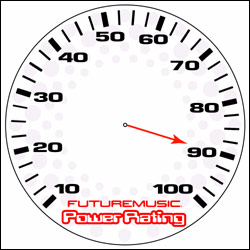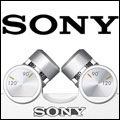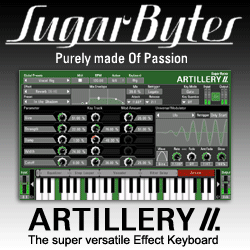|
|
|
|
|
|
|
|
|
|
|
|
|
||||||||||||||||||
|
|
|||||||||||||||||||
|
|
|
|
|
September 30, 2008 ../ TestDrive: Sony PCM-D50 Digital RecorderBefore the market exploded with portable digital recorders, Sony fired the first warning shot with their PCM-D1, an attractive and serious hand-held recorder that was only hampered from total adoption by its expensive $2000 price point. Beyond the budget, and some would say reason, of most users, Zoom, Roland, Olympus, M-Audio and others debuted their own digital recorders. They were quickly snapped up by consumers, and a new market segment was born.
Features:
The unit runs on AC juice, or convenient AA battery power, so you don't have to worry about recharging options in the middle of the wilderness when your trying to capture the elusive mating call of the North American Caribou. Just drop in a new set of batteries and you're good to go. Battery life is fantastic, so there's no need to stuff all your free pockets with 12 Packs wherever you roam on your recording adventures. Unfortunately, the PCM-D50 can only utilize Sony's proprietary, and spendy, Memory Stick Pro HG-Duo (try saying that 5 times fast) or Memory Stick Pro Duo Flash memory cards up to 4GB. However, the recorder has a 2GB file size limit, so you want to make sure to stop the recorder or hit "Divide" (more on this later) when the speaker takes a sip of water at that presentation you're capturing. Speaking of which, one of our testers took the fiddy to an audio conference and was quite pleased at the "quality of the recording" despite being way off to the side of the audience.
The interface on the PCM-D50's clear, orange LCD screen is all business with digital peak bargraph metering, file name, time, recording resolution, feature, battery life and transport indicators. Nominal and peak level metering is also available just above the display via LEDs. Navigation was very straightforward and more advanced users will never have to crack the manual for directions. The manual controls are conveniently located on the sides of the unit, and if you're right handed, adjusting the record level is simply a matter of rotating the dial with your thumb. Speaking of which, the recording level dial is protected from an unscheduled adjustment by a beefy metal shield — adding a "rugged" aesthetic as well. Sorting through recordings is a breeze thanks to a intuitive folder hierarchy that allows you to store your recordings according to whatever categorization you desire. When it comes time to dump what you've captured from the PCM-D50 to your computer, simply attach the supplied USB cable and the unit shows up as a hard drive on both the Mac and PC. Transfer is quick and painless, and no issues were encountered on either platform.
At the aforementioned conference, one tester sat in a variety of locations to capture the speaker's surround sound presentation. Even with background noise, and unfavorable positions inside the auditorium, the PCM-D50 "performed amazingly well." When reviewing the recording, the tester utilized the PCM-D50's real-time, Digital Pitch Control (DPC) which can adjust the playback speed between -75% and +100%, but retains the pitch/tone of the original recording. This is often called Master Tempo, or Pitch Lock on CD turntables, or time-expansion/compression on sampling devices. This feature allowed the tester to "easily transcribe quotes" by slowing down the audio speed. This same attribute also provided a way for another evaluator to learn a difficult passage in a guitar solo. "I was surprised how well the DPC worked. Not only did it effectively slow down the riff I was trying to learn, but the signal processing was excellent and retained the original values of the notes." "The PCM-D50's stereo image in the X/Y config was distinct and wide, adding dimension," revealed one tester who recorded a live concert. "Unfortunately, the omnidirectional essence of the mics...picked up a lot of ambient sound, which also could be attributed to the condensor's extremely low noise floor." The "ergonomic nature of the PCM-D50 made hand-held recording second nature, and I was able to ride the record level knob without a hitch." He summed it up by stating, "the PCM-D50 is a first-rate recorder that I wouldn't hesitate to recommend to users looking for mid-level device."
How does it work? Every time the PCM-D50 creates a recording, the DSP Limiter simultaneously records a second mirror track at -20 db. This duplicate track is stored in a buffer as the recorder evaluates the levels in real time. Should a transient peak overload occur, the backup audio is instantly normalized and inserted in place of the clipped signal. Although not perfect, it is seamless enough to "salvage many once-in-a-lifetime recordings," and should "not be overlooked." Want to digitize an analog recording or easily transfer digital recordings from a legacy device like a MiniDisc? No problem! Simply attach the mini optical jack from the MiniDisc digital output to the Sony PCM-D50's digital input and you're able to preserve the digital integrity of the original recording without going through needless conversions.
With the introduction of the PCM-D50, Sony reclaimed its rightful place on top of the affordable portable digital recorder food chain. Each one of our testers came away impressed with the recorder, and that's quite a feat considering it was evaluated in many different recording conditions. Although we would have liked to have the option to recording in the MP3 file format, this is only a mild gripe. Kudos to Sony for delivering on the promise of a quality mid-range digital recorder — Highly recommended. The Future: We'd love to see Sony add the ability to record in the MP3 format, as well as add support for other memory card formats. The Sony PCM-D50 retails for $599 and is available now. For more information on the PCM-D50, check out Sony's website.
>>> Back to Digihear?
Copyright © 2008 FUTUREMUSIC® All Rights Reserved. |
|
|
 With the introduction of the PCM-D50, Sony reclaimed its rightful place on top of the affordable portable digital recorder food chain. Each one of our testers came away impressed with the recorder, and that's quite a feat considering it was evaluated in many different recording conditions. Kudos to Sony for delivering on the promise of a quality mid-range digital recorder — Highly recommended.
|
|
|
|
|
|
|
|
|
|
|
|
|












